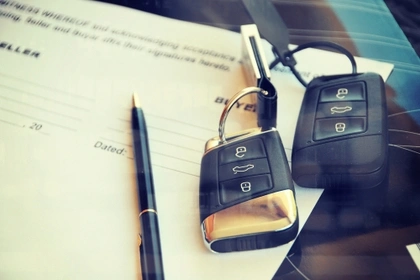Car finance vs. buying a car outright
Getting a car on finance is a popular way to pay for a vehicle, as it allows the buyer to split the cost into manageable monthly repayments. Even so, buying a car outright might be the cheapest option. You won’t need to budget for any monthly payments, it won’t affect your credit score, and once you’ve paid for the car, it’ll be up to you what you do with it – you can modify, paint, or sell it whenever you like.
However, buying outright is usually only a possibility if you have the money available, which could limit the make, model, and age of car you can afford.
Advantages of car finance
There are several advantages of car finance, especially as it can help people who have no other way of buying or owning a vehicle. In fact, a survey by AutoTrader found that 36% of car buyers choose to take out a car finance agreement because they wouldn’t be able to buy a car otherwise.
Spread the cost of buying a car
The ability to split the cost of a new car is arguably the biggest benefit of car finance. When you choose to find finance instead of buying outright, you don’t have to worry about emptying your savings pot or having to wait until you’ve saved the money you need. Instead, you’ll have the funds available to buy a car straightaway, in return for paying manageable monthly repayments over a set period.
Depending on the type of car finance you choose, you might not need to put down a deposit either. Some lenders offer no-deposit car finance, while others may ask you to pay just 10% of the total cost upfront.
Buy a more reliable car
If you do choose to apply for car finance rather than use your savings to purchase a car, you might find that you can afford a higher quality or newer model. There aren’t many things as frustrating as trying to get to work or take the kids to school on a cold winter morning and finding out that your car won’t start.
Unfortunately, cars can’t last forever, and breakdowns can get more frequent as vehicles age. Being able to buy a newer used car might mean it’s more reliable, has less wear and tear, and comes equipped with the latest tech features.
Maintain your monthly budget
No matter whether you opt for hire purchase (HP), personal contract purchase (PCP) or a personal loan, you’ll typically agree to a fixed rate. With this type of loan, your APR won’t change during the agreement, so your monthly payments will stay the same. Knowing exactly how much you’ll need to pay each month can help you build a budget that works for you long term.
Improve your credit score
While credit scores aren’t an exact science and can be affected by a range of factors, demonstrating that you’re a reliable borrower could help you improve your score over time. If you take out a car finance agreement and keep up with your repayments throughout the loan term, you’re showing lenders that you can manage your money well. This may also make them more willing to lend to you in the future.
Don’t worry about depreciation
All cars lose value over time – a process known as depreciation – but with PCP, you only have to borrow the difference between the cost of the car and its predicted future value when your agreement is due to end. And if you choose to take out a PCP loan, you don’t necessarily have to pay the remaining balance (known as the ‘balloon payment) to buy the car at the end of your agreement, either. Instead, you can choose to hand the car back to the lender when the loan term ends. This means you can simply walk away without having to worry about selling the car or its depreciated value.
However, keep in mind that if you decide to buy the car by paying the one-off balloon payment on PCP (or take out an HP or personal loan), depreciation will affect your vehicle’s future value.
Note, there may also be the possibility of using your car as a deposit towards a new car, if there is enough equity remaining when your deal ends.
Disadvantages of car finance
Of course, car finance isn’t the right choice for everyone and does have some disadvantages to consider. Depending on your circumstances, the car you want to buy, and how you plan to drive it, car finance might not be the best option for you.
Paying interest
In return for a lender covering the cost of a new car upfront, you’ll need to pay back the loan – typically with interest. The exact interest rate you’re offered will depend on several factors, including the lender that approves your loan and your financial history, but normally, the better your credit score, the lower the APR. It’s all about risk: if you’ve been a responsible borrower in the past, you’ll represent a lower risk to the lender. Even so, any interest paid will mean you end up paying more overall to buy a car than you would if you’d bought it outright with savings.
Stretching your monthly budget
Even when the cost of a new car is spread out over time, the monthly repayments can take up a sizeable amount of your disposable income. You’ll also need to budget for insurance, fuel, tax, and other running costs. That’s why it’s important to consider affordability (both now and in the future) before agreeing to a car finance loan. If you were to change your job or need to pay an unexpected bill, could you still comfortably cover your car finance payment?
Mileage limits
Some types of car finance, such as PCP, ask you to agree to a mileage limit. This will be determined at the start of your loan term and typically ranges from 10,000 to 30,000 miles. While this might not be an issue if you tend to stick to short journeys, if you do end up exceeding the agreed limit, you’ll probably have to pay a penalty charge per mile. However, other forms of finance, such as HP and personal loans, rarely include a mileage limit.
Impact your financial health
While car finance can improve your credit score, it can also have the opposite effect. If you struggle to keep up with the repayments and fall behind, you could end up with missed payments being marked on your credit report. This can lower your credit score. Car finance loans are also typically secured against the vehicle. If you stop making repayments, the lender will have the right to repossess the vehicle.
No modifications
With a PCP or HP car finance agreement, your loan is secured against the vehicle. This means that you won’t own it until you’ve finished making all your repayments and either paid the ‘Option to Purchase’ fee for HP or the one-off balloon payment for PCP.
You’ll be the car’s registered keeper who’s responsible for its upkeep, but the lender will be the vehicle’s registered owner. Any modifications that you’d like to make will either have to wait until the end of your loan term or be carried out with the lender’s express permission. This means you won’t be able to install a new sound system, adjust the suspension, or even customise the paintwork unless the lender agrees to it.
However, if you use a personal loan to buy a car, the vehicle will be yours to do with as you please.
How to secure the best car finance deal
The best car finance deals almost always depend on you and your individual circumstances. The most suitable option for someone else might not be the right choice for you. When doing your research, you can compare interest rates to find the most affordable solutions, as well as checking any charges or fees that are included in the loan. Putting down a large deposit upfront may also help, as it can decrease the amount you need to borrow to buy a car.
Finally, consider applying for a loan with a car finance broker that has access to a wide panel of lenders, as this can help you find the best deal.
Can I get car finance if I have bad credit?
If you’ve missed payments in the past, your credit score might need some work. But that doesn’t mean you won’t be able to get car finance. Bad credit car finance is available and there are lenders that specialise in offering poor credit car finance loans.
You can get an estimate of your monthly repayments with bad credit by checking our calculator for car finance and receiving a no-obligation quote that won’t affect your credit score.
Get Car Finance up to £100,000
- Check your eligibility without impacting your credit score
- No deposit needed
- Rates from 8.9%* APR
'Representative Example: Borrow £12,000 over 5 years with a £0 deposit. Representative 20.5% APR fixed rate. Monthly payment: £309.93. Option to purchase fee £10 payable. Total cost of credit: £6,605.80. Total amount repayable: £18,605.80.
We are a credit broker, not a lender. We partner with CarFinance 247 Limited, a credit broker (not a lender) who works with a wide panel of lenders.
Disclaimer: We make every effort to ensure content is correct when published. Information on this website doesn't constitute financial advice, and we aren't responsible for the content of any external sites.






